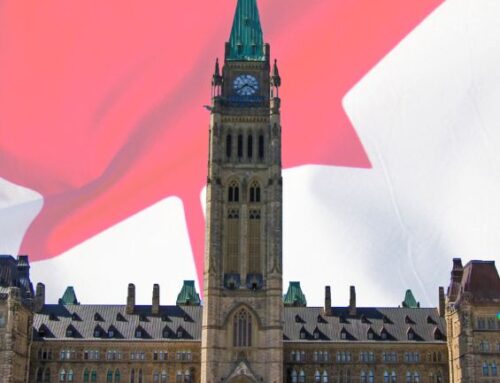McGuinty withdraws but doesn’t nix liberalized curriculum
Editor’s Note: There is sexually explicit content in this news article.

Premier Dalton McGuinty seemed to retreat on radically liberalizing Ontario's sex ed program.
On April 22, after two days of intense protest from parents and pro-family groups, Ontario Liberal Premier Dalton McGuinty announced he would delay the implementation of a new sex ed curriculum to re-examine its contents. The controversy began after Rev. Charles McVety, president of Canada Christian College in Toronto, announced he was organizing a protest against the new curriculum at Queen’s Park, planned for the Monday after Mother’s Day.
The 2010 health and physical education curriculum sparked public uproar because of its explicit content. In Grade 1, students were to be taught to identify genitalia using terminology such as penis, testicles, vagina and vulva. Grade 3 students would learn to respect “invisible differences,” such as gender identity and sexual orientation, alongside talents, beliefs, family background and allergies.
“This is part of a militant homosexual agenda to normalize homosexuality in everyone’s mind and thereby promote homosexuality,” McVety told the National Post. “If we teach our children these things … guess what? That’s what they’ll practise.”
In Grade 6, students would have learned about erections, nocturnal emissions and vaginal lubrication as normal changes that occur during adolescence. A teacher prompt reassures students that “exploring your body by touching or masturbating is something that many people will do and find pleasurable. It is common and is not harmful and is one way of learning about your body.”
Another point asks students to “assess the effects of stereotypes, including homophobia …” In response to a teacher prompt in the curriculum asking how stereotypes can be countered, the fictional student answer is: “We need to make sure that we don’t assume that all couples are of the opposite sex and show this by the words we use. For example, we could use a word like ‘partner’ instead of ‘husband’ or ‘wife.’”
In Grade 7, students were to learn that they can contract an STI if they engage in oral, vaginal and anal sex without using a condom. In Grade 8, students could discover the differences among “male, female, two-spirited, transgendered, transsexual, intersex … heterosexual, gay, lesbian, bisexual.”
In the proposed curriculum, a fictional student, replying to a suggested teacher prompt asking about the support people need to understand and accept their gender identities, states that it is important to have “all gender identities and sexual orientations portrayed positively in the media, in literature and in materials we use at school.” It is also important, the curriculum developers have the student say, to have “school support systems such as gay-straight alliances.”
Many concerned parents called talk radio programs and their local MPPs to express their opposition to the new content. Pro-family groups, led by McVety and the Canada Family Action Coalition, planned a protest and student boycott on May 10. Muslim and South Asian groups, such as the Somali Parents for Education, also protested the curriculum.
The Institute for Catholic Education and the Ontario Association of Catholic Bishops, who are both responsible for the Catholic school curriculum, said they would not teach the changes that are contrary to Catholic doctrine, even though Education Minister Leona Dombrowsky had said that ICE supported them. McGuinty said Catholic schools would have to implement the curriculum, but the Ontario Catholic bishops affirmed that they have the constitutional right to rewrite the items that go against Catholic teaching.
It was later revealed that ICE was in fact allowed by the ministry to draft its own supplement to reflect Catholic beliefs and would have received $75,000 from the government to put the revised curriculum into action. The funding, however, was cancelled when the new sex education curriculum was, at least temporarily, withdrawn.
Archbishop Terrence Prendergast of Ottawa urged parents to put forth “a firestorm of response” when the curriculum was released. “I believe one of the most important things for children in learning about family life and sexuality issues is to have it in the context of a warm family that explains things to them and helps them to deal with that,” he told the CanWest news service.
The curriculum was also criticized by the Progressive Conservative opposition. In the legislature, Christine Elliott, the critic for health, questioned why the changes were kept quiet. Elliott noted that there is no dearth of announcements from the education minister: “The minister did make announcements about eating standards in schools, welcoming students from Haiti, new school safety rules, graduation rates and hands-on technology training. If you stand behind your decision … then why didn’t you announce it?” she asked, implying that the government knew the new curriculum would be controversial.
The curriculum was indeed kept quite secret. In January, the new curriculum was quietly posted on the Ministry of Education website. On Jan. 18, the same day that school principals were sent a memo saying the curriculum would be implemented in September, then-education minister Kathleen Wynne, an openly lesbian MPP, was replaced with former Catholic school board trustee and chair Leona Dombrowsky in a cabinet shuffle.

MPP Frank Klees said parents should primarily be responsible for teaching children about sex.
Conservative MPPs John O’Toole (Durham) and Frank Klees (Newmarket-Aurora) both told The Interim that how children are taught about sex should be decided by the parents. Klees said the problem with the curriculum was “the nature of the material that’s being proposed for the very young children,” and he added they are “being exposed to gender identification and very sexually explicit information (that) isn’t appropriate for these ages.” Although the Ministry of Education claims many parents, teachers, more than 700 students and 70 community organizations were consulted beforehand, O’Toole told The Interim they probably “only consulted those with whom they agreed.”
O’Toole talked to many educators and parents who were uncomfortable with the education that was proposed. He, the grandfather of a child in Grade 2, felt that Grade 3 students would be going into too much depth at too early an age, especially regarding homosexuality. He said, “I think having children learning about inappropriate touching” and to stay away from strangers is enough. O’Toole also stated that learning about oral sex, anal sex and masturbation is unnecessary and inappropriate.
After initially defending the curriculum, McGuinty suddenly withdrew the new health curriculum’s sex ed components. According to the Toronto Sun, McGuinty had not read the changes until the day he withdrew them. “Even the premier, once he had the opportunity to look” closely at the curriculum, Klees told The Interim “realized it would be offensive to the majority of parents.”
But not everyone is pleased with the apparent reversal. David McKeown, Toronto’s chief medical officer, thinks the government made a mistake in withdrawing the curriculum. “Kids need clear, unbiased, age-appropriate information and parents need the support offered by a strong sexual health program in schools,” he said in an April 22 news release. “Rates of sexually transmitted infections are increasing. In a culture where unreliable information is rampant, it is essential that our schools protect public health and promote healthy sexuality by providing … sexual education.”
Peter Jon Mitchell, research analyst at the Institute of Family and Marriage Canada, pointed out that, “It is nearly impossible to present sex education as ethically sterile or value-less, because it deals with how people relate to one another at the most intimate levels.” He continued: “Parents are the primary sex educators and a number of studies demonstrate that parents are the most influential people when it comes to teen sexual choices.” Parents are best positioned to be able to deal with negative media influences, Mitchell said. They also know when and how to best broach the topic of sexuality with their children.
On April 27, McGuinty announced that the curriculum, without the sex education changes, will still be implemented in September. He has also announced that the new sex education curriculum, once implemented, will be mandatory for both public and Catholic schools. There is no indication of when this new curriculum will be ready and what exactly it will contain. On April 28, though, in a CTV report, he acknowledged that “it is time for a revision of the (existing) curriculum that is found in school at this point in time because it’s 12 years old. And kids have a lot more opportunity to gain access to info today in comparison to where they were 12 years ago.”
Jeff Gunnarson, a spokesman with Campaign Life Coalition, pointed out that McGuinty has not canned the proposal completely or even committed to rewrite the curriculum. “He is ‘re-examining’ the curriculum, so we’ll have to wait and see what he does and when he does it.” Gunnarson predicted that it wouldn’t be unlike the premier to try to ram the controversial changes through after the next election, or during the summer months, when parents might not be paying attention to news about their children’s schools.




